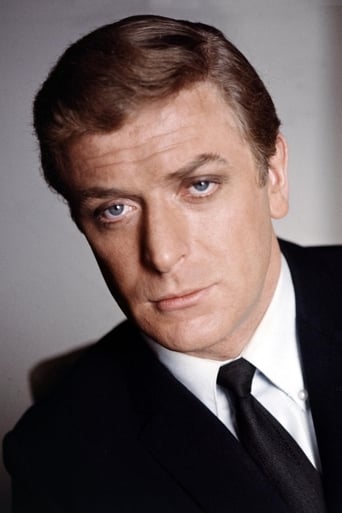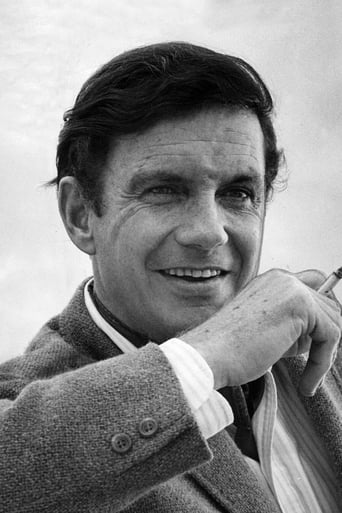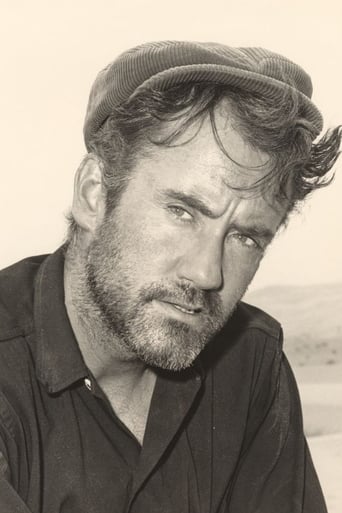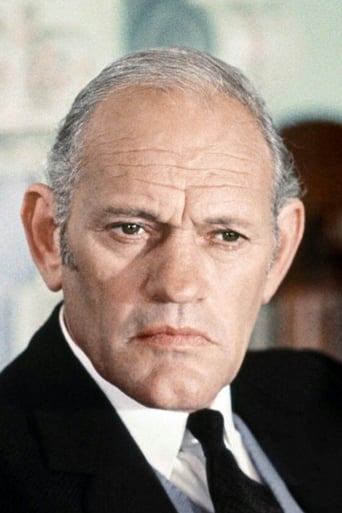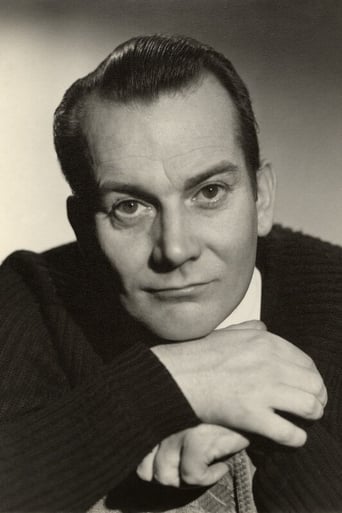Stellead
Don't listen to the Hype. It's awful
SanEat
A film with more than the usual spoiler issues. Talking about it in any detail feels akin to handing you a gift-wrapped present and saying, "I hope you like it -- It's a thriller about a diabolical secret experiment."
Cooktopi
The acting in this movie is really good.
Marva
It is an exhilarating, distressing, funny and profound film, with one of the more memorable film scores in years,
JohnHowardReid
Dialogue supervisor: Robert Sherman. Producer: Robert Aldrich. Associate producer: Walter Blake. (Available on an excellent Fremantle DVD). An Associates and Aldrich/Palomar Production. U.S. release through Cinerama: July 1970. U.K. release through C.I.R.O.: 18 October 1970. Sydney opening at the Paris. 16,135 feet. 144 minutes. Cut by the distributor to 133 minutes in the U.S.A.SYNOPSIS: Mixing the time-honored clichés of the war film with a fashionable dash of cynicism, "Too Late the Hero" has Robert Aldrich stamped all over it. — Nigel Andrews in Monthly Film Bulletin.COMMENT: The main impediment to a favorable review of Robert Aldrich's film is its length. It could be trimmed by at least 30 minutes to advantage. I would start in on Ronald Foster's part, then I'd eliminate some of the close-ups and needlessly repeated reaction shots in individual scenes and trim the long sequence of the microphone pursuit which, despite Aldrich's commendable use of the sound track, goes on for far too long. Fortunately, the film comes to an exciting climax with its obstacle race across the plain, and some of the photography here is absolutely breathtaking. In fact, most of the film was obviously lensed on location. There is not even a single frame of stock footage - which is a pleasant and most agreeable surprise. But on the debit side, the story is uncomfortably akin to an earlier Aldrich war movie, "The Dirty Dozen", which has a more entertaining script and higher production values than this one. Also that film's cast was far more interesting. Despite his prominence in the credits, Henry Fonda makes only a fleeting appearance, and neither Cliff Robertson nor Michael Caine have a strong enough screen presence to overcome some of the weaknesses in their material — although they both make a game try. Admittedly, reliable old Harry Andrews is back as the British C.O., and the rest of the players are competent, but unfortunately lack the sort of sparkle the film needs.
SimonJack
A few war movies have been made in which the lead actors play characters who are reluctant to be in the military or to take on their assignments. Not only are they not heroes, but they seem almost unpatriotic. We viewers, including those of us who are veterans, can understand that no one in his right mind truly wants to be in combat. But that doesn't mean one is a coward. A healthy dose of fear is not only common but natural. Survival in war isn't a matter of patriotism or not. Most of the time, men in combat follow orders because they must. There aren't other good choices. So, it's not very common to see or hear outright backtalk by men in combat. There also have been a few movies in which whole units or groups of combatants appear very lax and near to the point of insubordination. At that point, the ability of leaders to hold units together becomes precarious. Other than for comedies or spoofs of military life, most war films have not had such lax settings of troops. "Too Late the Hero" is an exception to both of these situations. Cliff Robertson plays Lt. Sam Lawson, who, as a Japanese language specialist, enjoys a life of ease and insubordination well behind the front lines in the Pacific. He is sent on a mission to an island occupied both by British and Japanese forces. The two forces have a sort of demilitarized zone between them. The British camp is under Col. Thompson, played by Harry Andrews. It is a lax operation, but capable of springing into action at a notice. Lawson is the only Yank in this bunch and is assigned to a squad of men who are to knock out a Japanese radio station. There's a little more to it than that. But the squad consists of several wisecracking, in- fighting and unenthusiastic Brits. They are capable, but they don't like being there or going on missions. Denholm Elliott plays Capt. Hornsby, who is in charge of the mission. Michael Caine is the co-star of the film and plays an enlisted medic, Pvt. Tosh Hearne. A host of good supporting actors makes up the rest of the members of the squad and some other Brits at the camp. The plot and script of this film are very good. The antagonism among the men is very interesting. One wouldn't expect it among comrades during a precarious combat situation. To say more about the story as it unfolds would lessen its enjoyment for viewers. Although the bickering and insubordination seem unbelievable at times, this movie has some very good drama. And the action is very good. The filming location in remote areas of the Philippine Islands lends authenticity to the movie.This film gives a decent portrayal of jungle combat which was a hallmark of the Pacific theater of operations during WW II. The other hallmark was the number and breadth of naval engagements, including aircraft. "Too Late the Hero" has the production quality, top acting and story that makes it a good film to have in any war movie library.
Robert J. Maxwell
Something of a proxy for the Vietnam War, it's the story of a handful of British soldiers and one reluctant American translator trekking through the bush on a Japanese-held island with the mission of destroying a Japanese radio station.The director, Robert Aldrich, is a Hollywood craftsman but adds little to a kind of paradoxical tale. Some of the men are killed -- by rifle bullet, by throat-cutting, by land mine -- and within minutes the others are laughing at land crabs or having petty fist fights about who owns a pack of Woodbine Cigarettes. They sneak through the enemy's jungle shouting, singing, and joking with one another. The gun shots don't sound like rifles at all. Your disbelief must not only be suspended. It must be hung by the neck until it is dead.The cast is fine, though, full of British character actors whose faces, if not names, will be familiar to many American viewers. Harry Andrews, of whom we don't see much, is unimpeachable as the colonel who plans the mission. Ian Bannen is always reliable and brings something personal to every role. He has the best lines in the script, if in fact they were in the script. His mates are schlepping a wounded Bannen across a muddy stream and he warns them in a Scots accent, "Watch out for those man-eating trout." When someone suggests leaving Bannon behind, he shouts out, "Listen to me, you bloody Glaswegian queer! That blood is worth bottling!" Denholm Elliott (later to die of AIDS) projects the personality and fixed expression of a frightened and neurotic worry-wort but proves to be pretty cold blooded. The young Michael Caine, as the medical orderly, has a winning smile. And Cliff Robertson, as the seconded American Japanese translator, doesn't damage the proceedings. His switch from slacker to determined leader takes ten seconds.The problem is that it's an ensemble movie and none of these fine actors has a chance to do very much. They die, one by one, with little drama and no visible remorse on the part of the remaining group. And the script is so self-contradictory that it virtually undoes the entire film. When Aldrich gets hold of a halfway decent script -- "The Dirty Dozen" or "Flight of the Phoenix" -- he handles it very well but he seems to have been reckless and put no effort into this rather ordinary war movie.Suspense in a movie like this is inevitable and it increases after the radio station is destroyed and what's left of the team tries to get back to the British base, with the enemy in hot pursuit. The Japanese are not treated as fools or as evil monsters. Ken Takakura, in his brief appearance as a major intent on capturing the patrol, is handsome and reasonable.Overall, this looks like what it is, a colorful Hollywoodish production. The score should have been written by Malcolm Arnold and conducted by Muir Mathieson. And I can't help wondering how David Lean would have handled the whole affair.
naseby
This story is seen as a Brit-flick, but it has to be said, was a fine American production, with the great Robert Aldrich at the helm. Previously having done the 'Dirty Dozen', a hard act to follow, a kind of 'Motley Crew', in came this film.A group, as I say of misfits, though not criminal are pitted with a neurotic officer, played well by Denholm Elliott, with American Lieutenant Cliff Robertson, the obligatory American to get the 'States audience to watch it, one would imagine (Just like his star part in 633 Squadron) along with the annoying but definitely watchable role for Michael Caine, one of his best in my opinion, even though it's not a million miles away from his true cockneyed accent! (Nor the kind of parallel with the great film 'The Long and the Short and the Tall', with Laurence Harvey playing the loudmouth).The plan is thus, for the group/platoon to eliminate a Japanese radio/communications station on the 'other side' of the Pacific island they both occupy. The jungle terrain of the interior is brought to life with the atmosphere of the sweat and later blood throughout the film as the platoon battle forward.Robertson's Lieutenant is quite an eye-opener too. Much like the reluctant William Holden's 'officer' in the 'Bridge Over the River Kwai', although he's not a 'fake officer' like that part, he's still an incredible workshy, lazy, enjoying the sun, sea etc, as he's had the cushy job of only getting his commission due to the fact he's an interpreter. Now he has a rude awkening as, being an interpreter with regards to this Japanese radio problem he's duty-bound for his talent to accompany the platoon, into the interior of the island and with a gun. The nice thing about his role is, that although we had the impression his 'cush gig' is over, he actually makes a fine officer, with tactics and strategy etc all along being at odds with Caine (Pte Hearne) and the 'off his rocker' Hornby. (Elliott) As Hornby cops out, Robertson makes good. Hearne takes on as platoon medic making sarcastic and insulting, but sometimes valid comments all the way. "He's got about as much class as a syphillitic roadsweeper!" he says about one of his compadres! The platoon are also made up of some great British character actors putting in fine performances too. Ian Bannen as the Scots roughneck but keeping the likes of the slimy equally excellent Ronald Fraser in line is worth watching and of course the great Percy Herbert. Although some on IMDb have said they found the scenes too talky, I think they had this mix of action and words just right.The memorable scenes are the opener, which shows the remnants of the first platoon in the film 'coming in', across a wide opening from the jungle, trying to beat their Japanese pursuers to their lines, exhausted, bedraggled and zig-zagging to avoid the Jap machine gun fire, whilst all along their Brit chums on their line are shouting them on to get across. This is also where the film ends with the remnants of this present platoon and quite a shock twist. We see the only remaining members making for their lines and not knowing who is going to make it - the two that do are Caine and Robertson. Harry Andrews as the CO is then seen looking down at the only surviving platoon member - and lo and behold, it's Caine who gets up. All along I was thinking obviously the American is going to make it, but I was glad it was Caine - not because I am British or biased, but because I didn't think it was the typical ending I expected. Perhaps some Americans may say the same about Caine, as he's British and it was a British platoon, I don't know. But it was an enjoyable film all the same and one of the best, as I have said, lesser-known/publicised WW2 flicks.


